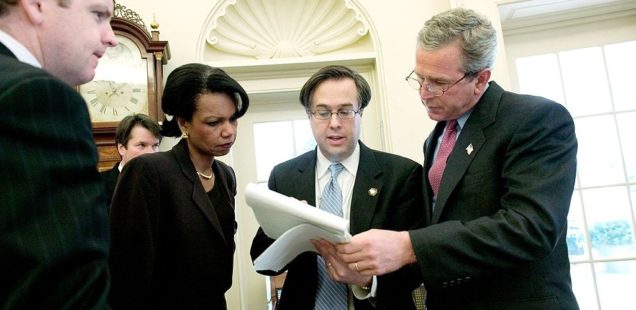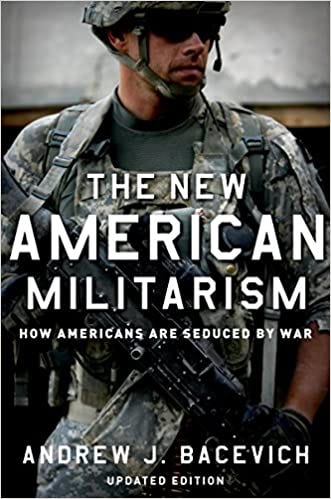
“With God on his side.”
The Washington Post’s resident theocrat.
The Washington Post’s Michael Gerson is at it again. In a recent column, the theocrat and armchair militarist alerts readers that the real danger to the republic lies not in the emerging of among Wall Street, Silicon Valley oligarchs, and the national security state—and really, given who writes Gerson’s checks, how could he think otherwise?—but in the politics of a small Eastern European democracy some 4,500 miles from Washington.
According to Gerson, the specter of national conservatism, as embodied by Hungary’s Viktor Orbán and Fox News host Tucker Carlson, represents a truly ominous development. But, as is common among Gerson’s tribe of cosseted D.C. liberal internationalists and neoconservatives, he mistakes a threat to his own class for that of the country-at-large. These are two very different things. And indeed, as we have seen over the course of the past 30 years, the one has increasingly little to do with the other.
In another recent Post column, Gerson condemned President Biden’s decision to withdraw from Afghanistan, calling it the “last gasp of America First.” Gerson, a chicken hawk who badly needs his wings clipped, dismisses the cost of keeping American troops stationed in Afghanistan in perpetuity as “minimal” and, still worse, “a spiritual victory of Trump’s America First.”
That Biden’s decision to put an end to a counterproductive, costly, 20–year war that has taken the lives of 2,400 US soldiers and more than 71,000 Afghan civilians would earn the ire of Gerson et al. cannot come as much of a surprise. During the 2000s, Gerson personified the toxic combination of theocratic dogma and imperial hubris that defined Bush’s presidency. The repudiation of that brand of pro-war, corporate, “conservative” politics by millions of Republican voters in 2016 and 2020 must be painful to face for a longtime GOP operative such as Gerson.
After all, Gerson has devoted his professional life to his party. After graduating from the evangelical Wheaton College in Illinois, Gerson went on to work as an adviser to Indiana Senator Dan Coates and as a speechwriter for the Steve Forbes campaign and Dole/Kemp ticket in 1996. He was recruited by Karl Rove to join the Bush campaign in 1999.
Gerson’s problem (and that of the other Conservative Inc. drones one encounters on Morning Joe or in little-noticed neocon webzines such as The Bulwark) is that he has never come to terms with what he himself helped bring about. Carlson, once a member in good standing of the “conservative movement,” recognized the reality early on: Endless wars, free trade, open borders, and the financialization of the U.S. economy was a combination that was literally killing everyday Americans—and in large numbers.
But Gerson always had “higher” priorities than whatever catastrophic effects these policies were having on “flyover” country. Gerson’s principal project was to convince those who hardly needed convincing that God is on Our Side.
As the writer and scholar Andrew Bacevich points out in The New American Militarism (Oxford, 2013), in the decades following the end of the Vietnam war,
conservative Christians have conferred a presumptive moral palatability on any occasion on which the United States resorts to force. They have fostered among the legions of believing Americans a predisposition to see U.S. military power as inherently good, perhaps even a necessary adjunct to the accomplishment of Christ’s saving mission. In doing so they have nurtured the conditions that have enabled the American infatuation with military power to flourish.
And in this respect Gerson is hardly alone. Theocratic militarists such as former CIA director and secretary of state Mike Pompeo, Texas Senator Ted Cruz, South Carolina Senator Lindsey Graham, GOP representatives Adam Kinzinger, and, of course, the loathsome Liz Cheney are all among the leading figures of the Christian-militarist wing of the Republican Party. Yet, Gerson, by way of his Washington Post column remains one the Bush era’s highest-profile alumni—and his devotion to the cause has never wavered—despite the multiple catastrophes that have come as a result of the evangelical militarism he has long espoused.
Perhaps Gerson’s most enduring contribution to this project was Bush II’s second inaugural speech, delivered 20 January 2005, in which the president adopted a strident evangelical militarism as national policy. In a review of the speech published the following day in The Wall Street Journal, former Reagan speechwriter Peggy Noonan wrote that she found it “startling.”
Noonan continued,
It was a God-drenched speech. This president, who has been accused of giving too much attention to religious imagery and religious thought, has not let the criticism enter him. God was invoked relentlessly. “The Author of Liberty.” “God moves and chooses as He wills. We have confidence because freedom is the permanent hope of mankind . . . the longing of the soul.”
It seemed a document produced by a White House on a mission. The United States, the speech said, has put the world on notice: Good governments that are just to their people are our friends, and those that are not are, essentially, not.
A Washington Post report in the run-up to the Iraq fiasco, published 11October 2002, five months before the mess began, described Gerson’s role as White House propagandist-in-chief, writing speeches for Bush that provided “vivid evidence to the American public of the risk posed by [Saddam] Hussein, yet try to convince voters that Bush would not attack Iraq rashly. He had to scare people and reassure them at the same time.”
According to the most recent figures released by Brown University’s Cost of War Project, more than 800,000 people have died in the post 9/11 wars “due to direct war violence, and several times as many due to the reverberating effects of war,” at a cost to the U.S. taxpayers of $6.4 trillion.
Having learnt nothing, Gerson continues to use his perch at The Washington Post to agitate for further American interventions in Syria, against diplomacy with North Korea and Iran, and, of course, for our continued presence in Afghanistan.
In the end, Gerson’s criticism of the Afghan withdrawal, and of conservatives such as Carlson who champion realism and restraint, boils down to a barely concealed disdain—and never mind the ostensibly charitable Christian instincts—for the millions of American voters who reject his brand of pro-war corporate conservatism in favor of a more modest, less intrusive politics that promotes the common good.


